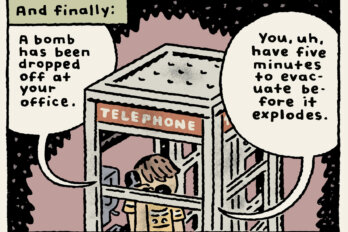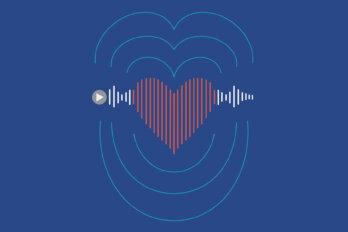Poetry, said W. H. Auden, is “memorable speech.” It’s a reasonable definition: broad enough to include a lot of flora and fauna, but strict enough to put up fencing. You should be able to say a poem, and your head should want to hold on to it. Rhyme and meter can help with this. So, too, can a vivid image. “The stars are not wanted now; put out every one. / Pack up the moon and dismantle the sun.” That’s Auden, and just try to forget it.
There are always outliers, of course—“concrete poems,” where clusters of words are shunted into shapes and pictures, or “sound poems,” where a poet uses their voice to honk out patterns of noise. But most civilians know a poem when they see one. A poem strikes us as inevitable: it can be no other way, employ no other words. This is an illusion, of course, but the poem pulls it off because it’s already pressed itself upon our memories. Auden’s every move—the way the sound of “pack” pays off “put”; the way the stock cosmic props are redeemed by the strangeness of “dismantle”—lays down ruts in the mind. We’re duly reassured we’re dealing with the real thing.
It’s the insiders—the poets, the tenured—who like to “problematize” poetry and wield their whatabouts. The “prose poem” is one of the most abiding whatabouts. It remains an outlier, a problem. “A prose poem is a poem without line breaks,” writes Jeremy Noel-Tod in the introduction to his recent anthology, The Penguin Book of the Prose Poem. Blame the French, who revel in unravelling categories. Aloysius Bertrand, in the nineteenth century, was the first to compose a block of text and call it poetry. Other beloved disturbers of shit, like Baudelaire and Rimbaud, later took up the idea. Prose poetry didn’t catch on in North America for another century or so. Even then, it remained controversial. When Mark Strand’s book of prose poems The Monument was up for a Pulitzer, in 1979, one of the judges, Louis Simpson, dissented. The Monument, felt Simpson, just wasn’t poetry. (“If a prize intended for playing the violin were awarded to a trumpet player,” he reportedly said, “everyone would see immediately how absurd and unacceptable this was.”)
Noel-Tod, a lecturer at the University of East Anglia, declares that prose poetry is “the defining poetic invention of modernity” and marvels that the form is “suddenly everywhere.” He’s probably right about its popularity. A book of the stuff, by Eve Joseph, just scooped up Canada’s $65,000 Griffin Poetry Prize. Other twenty-first-century attempts have drawn acclaim: Claudia Rankine’s book-length meditation on race, Citizen: An American Lyric, and Patricia Lockwood’s viral “Rape Joke.” Plenty of legacy brands have dabbled in the form, too: Elizabeth Bishop, say, and Seamus Heaney. Noel-Tod’s anthology covers a spectrum, including translations. Front-loaded with contemporary examples, the book runs backward, irising out toward the middle of the nineteenth century.
But all this history and activity does nothing to make the form, for skeptics, convincing rather than contrived. Here, in full, is “The Mysterious Arrival of an Unusual Letter” by Strand:
It had been a long day at the office and a long ride back to the small apartment where I lived. When I got there I flicked on the light and saw on the table an envelope with my name on it. Where was the clock? Where was the calendar? The handwriting was my father’s, but he had been dead for forty years. As one might, I began to think that maybe, just maybe, he was alive, living a secret life somewhere nearby. How else to explain the envelope? To steady myself, I sat down, opened it, and pulled out the letter. “Dear Son,” was the way it began. “Dear Son” and then nothing.
Isn’t this just postcard fiction? A prose vignette? A plain old short story? (Strand himself seemed content with the modest term “prose piece.”) You could place those ten sentences at the start of one of Paul Auster’s postmodern thrillers and no one would be the wiser. A prose poem, we might conclude, is a stretch of prose willed into being something else by sheer force of naming. It’s an act of alchemy. It’s a leap of faith. It’s Genesis 1:3—let there be poem.
Perhaps feeling the pressure, Noel-Tod has packed his introduction with an impressive compilation of definitions and justifications. He seems to have read everything anyone has ever had to say or write about the oxymoron, going back centuries. He doesn’t quarrel with any of it; if someone’s had a thought about the form, Noel-Tod is happy to log it. It’s as if piling up enough statements by enough eyewitnesses will prove this yeti is a legit species that can be tagged and taught. It’s not a bad approach; the form needs all the help it can get.
One of Noel-Tod’s witnesses declares that the prose poem “is the circle we draw around our interactions with the world.” Another says it “resonates with ‘the absences that it accommodates.’” These soft-focus definitions should give us pause. Sonnets, villanelles, ballads, heroic couplets—a critic can be crisp about such things because they have apprehensible contours. The advocates for the prose poem, however, tend to lapse into a fatal fuzziness that betrays the emptiness of the form they’re plumping for.
Put another way: if you accept that Strand’s brief story is a poem, then everything is a poem—and nothing, too. Prose poetry is the original trolling.
Central to Noel-Tod’s introduction is the assumption that the prose poem’s lack of boundaries is a good thing:
Without line breaks, the prose poem is free—like this paragraph—to extend across and down the page as far as the printer’s margins will allow. And it is in this freedom that we can locate the distinctive feeling to which the prose poem gives form: expansiveness.
Indeed, Noel-Tod argues, the prose poem has a “genius for expansiveness.” But, then, you could say the same thing about other expansive phenomena, like forest fires, cancer, and man-spreaders on public transit. Why is expansiveness a plus? “The prose poem,” Noel-Tod writes, “drives the reading mind beyond the city limits.” Is the prose poem really a chauffeur for the “reading mind”? Are city limits still the threshold to the unknown that Noel-Tod seems to think they are? Beyond many city limits, one finds suburban sprawl, maybe a Boston Pizza. Unsurprisingly, once we’re past his introduction—and its utopian talk of “mind-expanding revelations”—we find a conspicuous uniformity of voice and style. Here’s the work of one poet in the Penguin book:
A text, resting on a table, having been turned to a page of illustrated finches years before. (The page was torn out years before.) And beside it, the tumbler of water. And beside themselves, the finches. And where the page was torn, an edge. An absence. A muted singing.
And another:
To light a lamp is to hide darkness in the same closet as sleep, along with silence, desire, and yesterday’s obsessions. To read a book is to marry two solitudes, the way a conversation erases and erects, words prepare for wordlessness, a cloud for its own absence, and snow undresses spring.
And another:
Imprecise, as a world seen through cloth, ease of the friend that follows. Agony internal to the shape. The tinier holes through which a quality refines. A private lack, a riveting in some riveting act.
And another:
Because I refuse to accept the opposition of night and day I must pit other, subtler periodicities against the emptiness of being an adult. Their traces inside my body attempt precariously, like any sign, to produce understanding, but though nothing may come of that, the grass is growing. Can words play my parts and also find their own way to the house next door as rays converge and solve their differences?
On and on, for pages on end, the reader’s mind going blank, fogging up in the face of so much hot air. When prose poems don’t sound like Strand’s piece—that is, like straight up exposition—they tend to sound like the excerpts above: ponderous, imprecise, and indistinguishable. Dispensing with Noel-Tod’s “city limits” has left his poets free all right—free to be slack, vague, clichéd, and repetitious.
As the book winds down, and as the reader approaches the nineteenth century, the clichés shift, and the poems fill up with darkness, stars, flowers, and moons. Surely one reason for the enduring appeal of the prose poem is that it offers the neophyte a shortcut to poetic profundity. What could be more alluring than a form that absolves the poet of holding a beat or sticking a rhyme? The poet becomes a consciousness ranging forth, so breathlessly inspired, so seized by their line of thought, they can’t even pause to break a line. (To wit: I made up an excerpt above, the first one, in a few minutes. I felt duly mystical.)
The barrier to writing poetry, let alone the prosy kind, is already enticingly low. Nearly every attempt to stretch the definition of poetry has generally loosened what it once required of its practitioners. Free verse ditched ABAB. Language poetry, syntax. “[P]rose,” Noel-Tod cheerfully points out, “is a mode of writing that allows the stylist plenty of slack.” Here, the editor betrays the mistaken belief that more rope—more freedom—means better art. In fact, if you want to ruin an artist, give them a blank cheque, too much time, and no limits. See Orson Welles, Fran Lebowitz, and Guns N’ Roses. “No verse is free for the man who wants to do a good job,” warned T. S. Eliot, the guy who helped make free verse cool.
There is some good stuff in the Penguin book, but it’s strewn, star-like, across a lot of void. Blink and you’ll miss Laura Kasischke’s brief piece about a father’s Alzheimer’s, which is one of a scant few examples to use repetition for a more compelling reason than to make its author sound oracular. There are mild gags, anecdotes with shiv-sharp twists, and the odd poignant item: Jane Monson’s “Via Negativa,” about a mother felled by an epileptic attack, or Czesław Miłosz’s “Christopher Robin,” in which Winnie the Pooh contemplates aging and death, “matters too difficult for a bear of little brain.” These are neither straight-up prose vignettes, like the Strand, nor expansive clouds of dry ice, like so much else in the book. They have a sense of style, economy. They resist the prose poem’s worst impulses.
Eliot considered the prose poem “an aberration which is only justified by absolute success.” Patricia Lockwood’s “Rape Joke” is one such success, but hardly an exemplar of the sort of thing the Penguin book makes compact with. Using anaphora—most of its paragraphs start with “The rape joke . . .”—Lockwood’s speaker recounts a rape:
The rape joke is that come on, you should have seen it coming. This rape joke is practically writing itself.
The rape joke is that you were facedown. The rape joke is you were wearing a pretty green necklace that your sister had made for you. Later you cut that necklace up. The mattress felt a specific way, and your mouth felt a specific way opening against it, as if you were speaking, but you know you were not. As if your mouth were open ten years into the future, reciting a poem called Rape Joke.
The rape joke is that time is different, becomes more horrible and more habitable, and accommodates your need to go deeper into it.
Just like the body, which more than a concrete form is a capacity . . .
And so on. It’s a moving, controlled performance, every word in its place, every paragraph paying off. Its precision and music—“more horrible and more habitable”—set it damningly apart from so many of its peers. It’s one of a few exceptions that prove the unruliness all around.
A more ruthless editor might’ve made a stark choice and printed the finest forty prose poems in the language. A top forty. A statement. But focusing the reader on atypical outliers by great individual talents is not the MO of Noel-Tod, nor is it that of most anthologists, who are in the business of bringing the good news about a form, a school, or an era. Anthologies tend to serve the interests of professors, who have ground to cover, and not those of readers, who can only be wowed one great poem at a time. Bulk surveys prioritize a topic—the prose poem, the Renaissance, war—over individual genius. Preoccupied with forests, anthologists inevitably miss the trees.
Indeed, the Penguin book marshals plenty of examples by poets, like Elizabeth Bishop, not necessarily known for their prose poems. For poets like Adrienne Rich and John Ashbery, the prose poem seems to have dangled a deceptive freedom. For others, it seems to have been a fad, a fondue kit, something to try one’s hand at. Major talents will often dabble in a form to dispense with it; in Bishop’s wake, you’ll find a litter of clothes tried on briefly. Yet who would prefer Seamus Heaney’s “Fiddleheads” to even a stanza of “The Harvest Bow”? Here’s the former, in its entirety:
Fiddlehead ferns are a delicacy where? Japan? Estonia? Ireland long ago?
I say Japan because when I think of those delicious things I think of my friend Toraiwa, and the surprise I felt when he asked me about the erotic. He said it belonged in poetry and he wanted more of it.
So here they are, Toraiwa, frilled, infolded, tenderized, in a little steaming basket, just for you.
And here’s the final stanza of “The Harvest Bow”:
The end of art is peace
Could be the motto of this frail device
That I have pinned up on our deal dresser—
Like a drawn snare
Slipped lately by the spirit of the corn
Yet burnished by its passage, and still warm.
The former is charming, sure, but slight, like a well-turned inscription. The latter, on the other hand, is less perishable, more musical. Masterful. The half rhymes that bind the lines (“peace/device,” “dresser/snare,” and “corn/warm”), the pulsing iambs, the warm alliteration (“burnished by”)—all of these elements, carefully deployed, give the passage lift and life. More importantly, they encourage the mind to memorize.
Eliot came to characterize his own attempt at prose poetry, “Hysteria,” as “a kind of note for a poem, but not . . . a poem.” Noel-Tod has included it anyway. Some of the entries in the Penguin book might seem new to readers, but that’s probably because they’ve been the B-listers in their authors’ bodies of work. They should’ve been forgotten, but these underdogs, believes Noel-Tod, form “an alternative history of modern poetry and an experimental tradition that is shaping its future.” It’s a pretty thought. It conjures up a past when the adjective “alternative” still meant something cool. It gives otherwise dull blocks of unmemorable text an edge.





